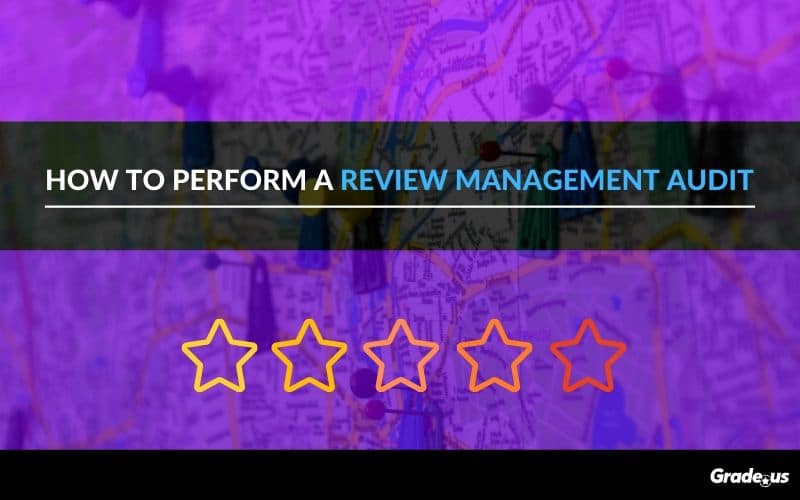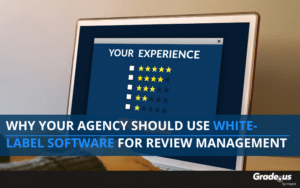A review management audit gives you actionable data and a clear set of guidelines you can use to boost the number of leads, sales and customers you attract for your clients (or your business).
It might be the simplest way to boost your marketing conversion rate.
Audits provide clarity.
Table of Contents
Is a review management audit really necessary?
They’re only reviews after all. Isn’t it just as simple as looking at your review profiles, seeing that you need more reviews, then adding more on an as-needed basis?
Absolutely not.
An audit gives you a specific set of data you can use to direct your review management campaigns in the direction you’d like them to go.
Like I said, clarity.
This clarity gives you the competitive intelligence you need to make profitable changes in your review management portfolio. A regular audit of your reviews gives you the direction you need to transform customer perceptions and beliefs at a fundamental level.
An review management audit shows you…
- What your customers are happy and unhappy when it comes to both your product, service, and business operations.
- The core issues or challenges that cost your business leads, sales, or revenue.
- Insights into the ingredients customers need to trust you and your business.
- What customers want from your business, but will absolutely refuse to share with you (until they proceed with a public celebration or shaming).
- What actionable steps you can take to systematically 2x, 4x and even 10x your business.
When you act on the information of your online reviews, you can take some important steps to improving your business. Too many businesses don’t pay attention to their reviews. It’s a passive customer feedback channel for them. It’s also a missed opportunity. Your review management audit can change that.
How to perform your review management audit
It isn’t rocket science.
You’re taking an inventory of your online reviews, collecting data, and assessing current trends. This all sounds fairly straightforward and it is.
Step #1: Claim and complete your review listings
There’s a larger review ecosystem for every type of consumer. When you’re starting to evaluate where you want to generate reviews, you want to research a few different options.
- Mainstream sites (e.g. Google, Facebook, Yelp, and the BBB).
- Industry-specific sites (e.g. ZocDoc for doctors, Avvo for lawyers, TripAdvisor for hotels and restaurants, Edmunds for car dealers).
- Niche platforms (e.g. Houzz for home service professionals, Zillow for realtors, Clutch for agencies or Capterra or G2 for SaaS businesses).
You’ll always want to start with Google and the mainstream sites first.
Once you’ve claimed, developed and optimized Google, Facebook, and Yelp, go after any industry-specific and/or niche review platforms. Most of your prospects will visit mainstream platforms first. But you’ll also receive a significant amount of attention from smaller platforms as well. Visitors from the industry specific review sites tend to have stronger buyers intent and are more likely to solicit your services. These leads are gold.
Feeling unsure?
Here’s a detailed set of instructions and a review management checklist for setting up your review management program.
Next step.
Where do you go to perform a review management audit of how your business review listings appear to potential customers in search results? The answer is obvious, isn’t it?
You go to Google.
Step #2: Search for "[your business] + reviews"
Where does your business fit in Google’s local 3 pack (if it’s even in there)?
Is your business visible in the search results?
What about your online reviews?
You’ll want to see:
1. That your business appears for branded/unbranded queries (e.g. “[business name] + reviews”, “[industry] + near me”, “[industry] + [location]”).
2. Aggregate reviews from each of the mainstream, industry-specific and niche review platforms in your list.
3. Does your business appear (with aggregate reviews) for industry and location specific queries?
Let’s take a look at an example.
Imagine that you’re managing the review portfolio of Downtown Dental Loop Dentistry based out of Chicago. Let’s also assume that you’re looking for answers to the same questions I’ve shared above.
Here’s how you’d find them.
You’d head over to Google and you’d run a list of unbranded queries to take an inventory of where you stand.
- [Chicago dentist]
- [Chicago dentists]
- [Dentist Chicago Loop]
- [Dentists Chicago Loop]
- [Dentist near me]
- [Dentists near me]
- [Dentists in Chicago]
- [Dentists near Chicago]
You’d also want to conduct a series of searches using via branded queries:
- [Downtown Dental]
- [Downtown Dental Reviews]
- [Downtown Dental Testimonials]
- [Downtown Dental Loop]
- [Downtown Dental Loop Reviews]
- [Downtown Dental Loop Testimonials]
You’ll want to take a screenshot of the local three pack, whether it includes your business (or not).
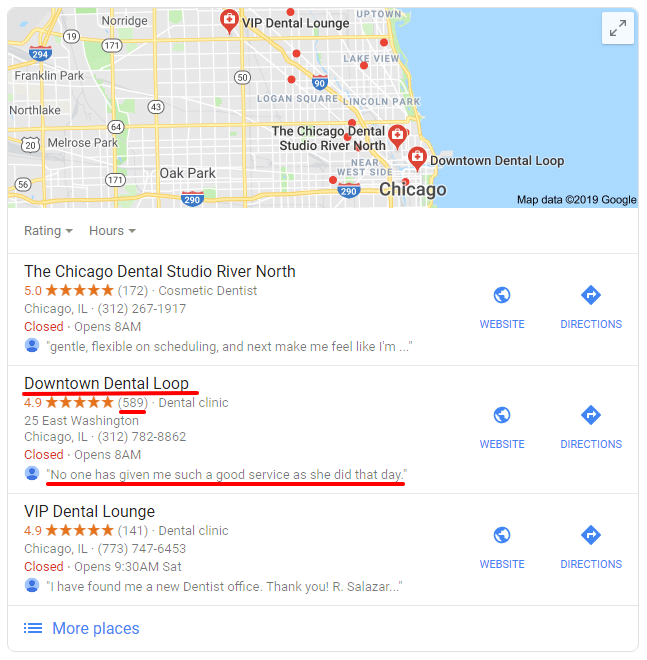
You’ll also want to take a screenshot of the search results (including knowledge panel) for each of your queries.
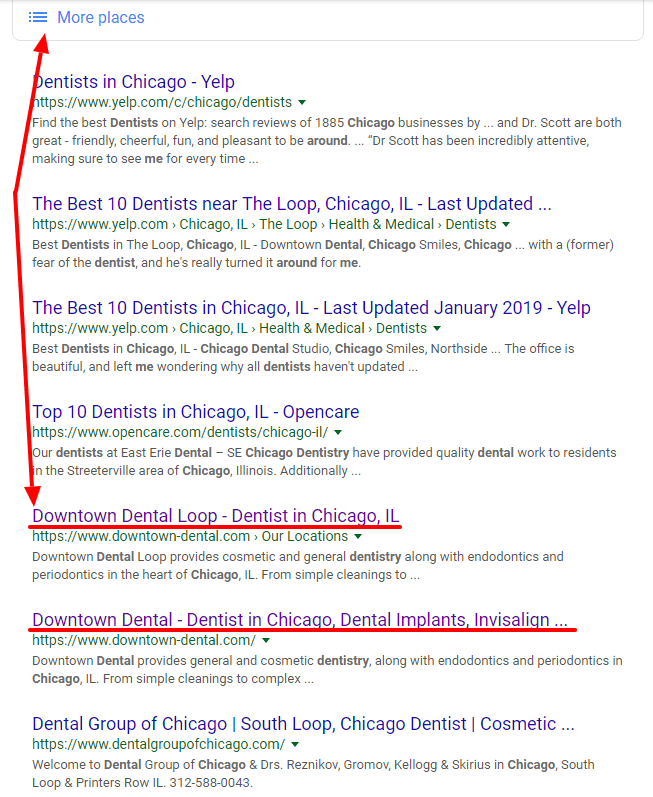
Remember, you’re looking for a strong showing in the search results. You’re also looking for aggregate reviews listed in the search results.
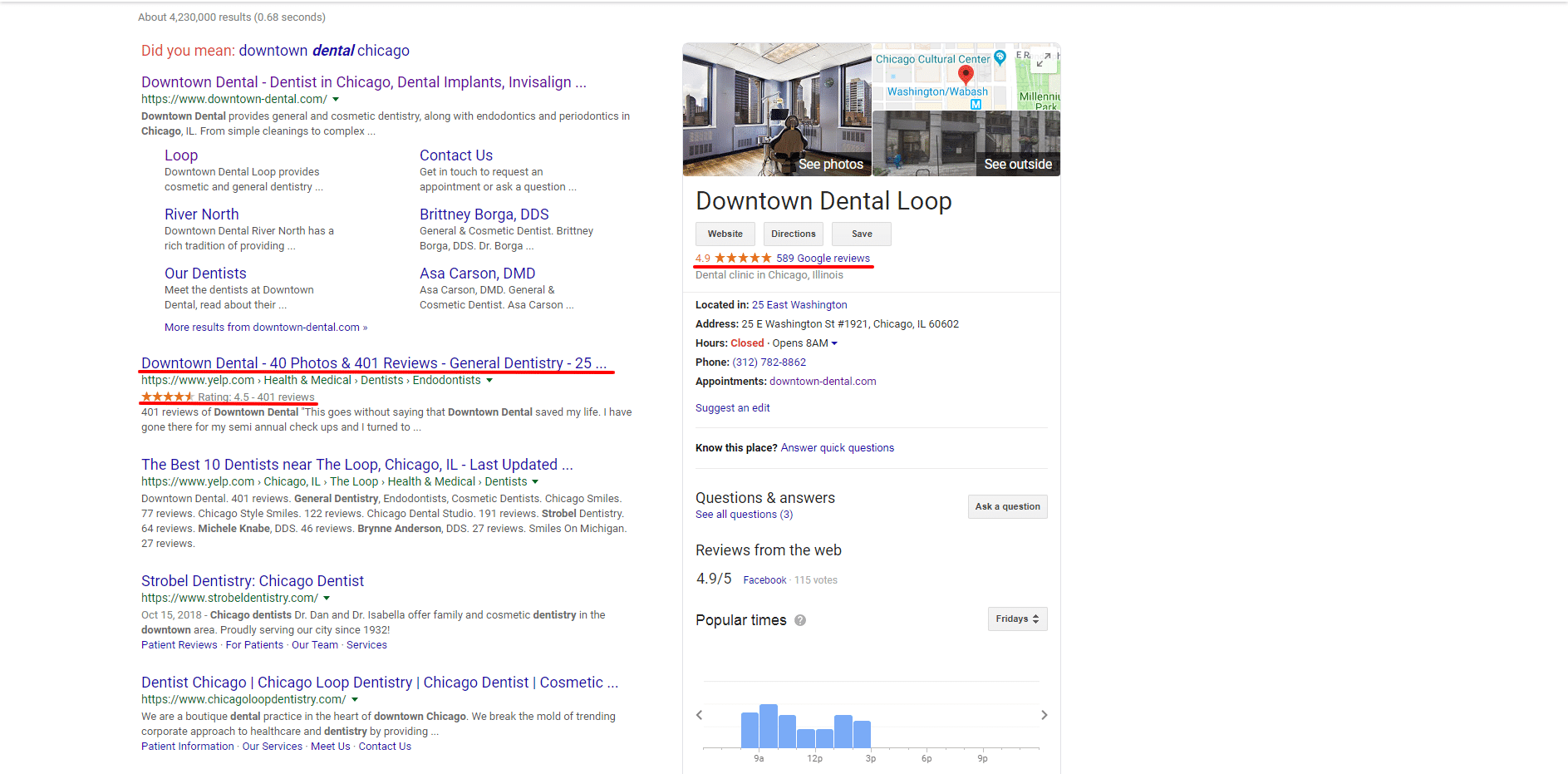
Have all that?
Good. Now it’s time to save your screenshots. When you save these screenshots, you’ll want to record data in the file name itself so it’s easy to remember key details later.
- Date of collection (year/month/date)
- Browser
- Keyword query
You’ll want to include these details in the file name itself, like this:
2020_02_01_Chrome_Dentists-near-me-Chicago
Finally, create a folder for these screenshots. You can be as detailed and precise as you prefer. You can store these screenshots in a single folder, divide them by query, months, or year.
It’s up to you.
A word about frequency. You’ll want to run these audits at regular intervals. The question here is, how often? The unsatisfying answer?
It depends.
It depends on a variety of factors. If you’re in a hyper competitive industry (e.g. real estate, insurance or mortgages), you’ll want to run your audits regularly (once or twice a month). If your industry isn’t as competitive, you can run audits bi-monthly or quarterly.
Why audit regularly?
If they’re smart, your competitors will take note of the changes that you’re making. They’re going to do their best to adapt. This means you’ll need to adapt to their changes.
It’s a constant game of moves and countermoves. As you and your competitors jockey for position, these regular review management audits provide you with the precious intelligence you need to win.
Step #3: Plug in your data
You’ll want to create a spreadsheet that tracks the important details of your review management audit. This spreadsheet should track the following:
- Review quantity. This measures the amount of the number of reviews you have across your mainstream, industry and niche review profiles. You’ll want to limit your attention to the reviews collected in the last one to three months. Remember to track your original collection date.

- Aggregate rating for each review site/platform. As we’ve seen this aggregate rating appears in the search results for each review site. The more popular the review platform, the more likely it is to appear in the search results.
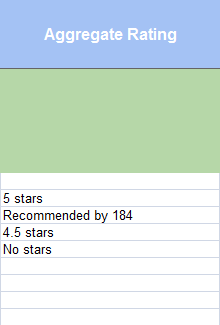
- Number of recent reviews in the past month/three months. Customers devalue reviews that are older than three months. In their mind, these reviews simply aren’t relevant. This doesn’t mean older reviews have zero value, it simply means it has less impact on purchase decisions.
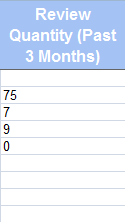
Next, you’ll want to do the same thing with your top three competitors. Who are your top three competitors? The businesses listed in the local three pack or the top three search results for your queries.
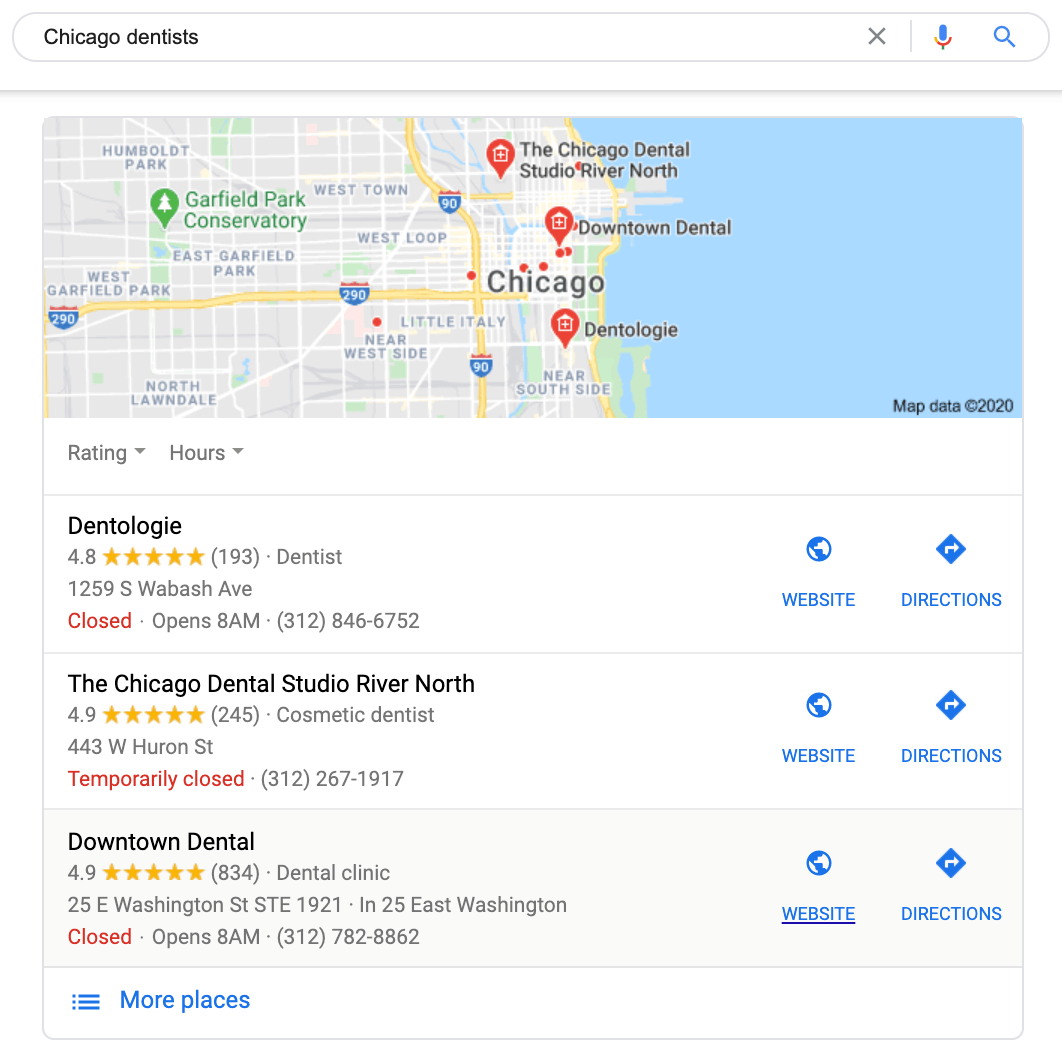
Modify each of the keyword queries in step two for each of your competitors. Then go through and collect the same data for each. This works amazingly well with the right spreadsheet. It’s fast, efficient and simple to do.
There’s an easier way.
If you’re using online reputation management software like Grade.us you can automate or semi-automate a large portion of the work. The results you receive are collected automatically, kind of like this:
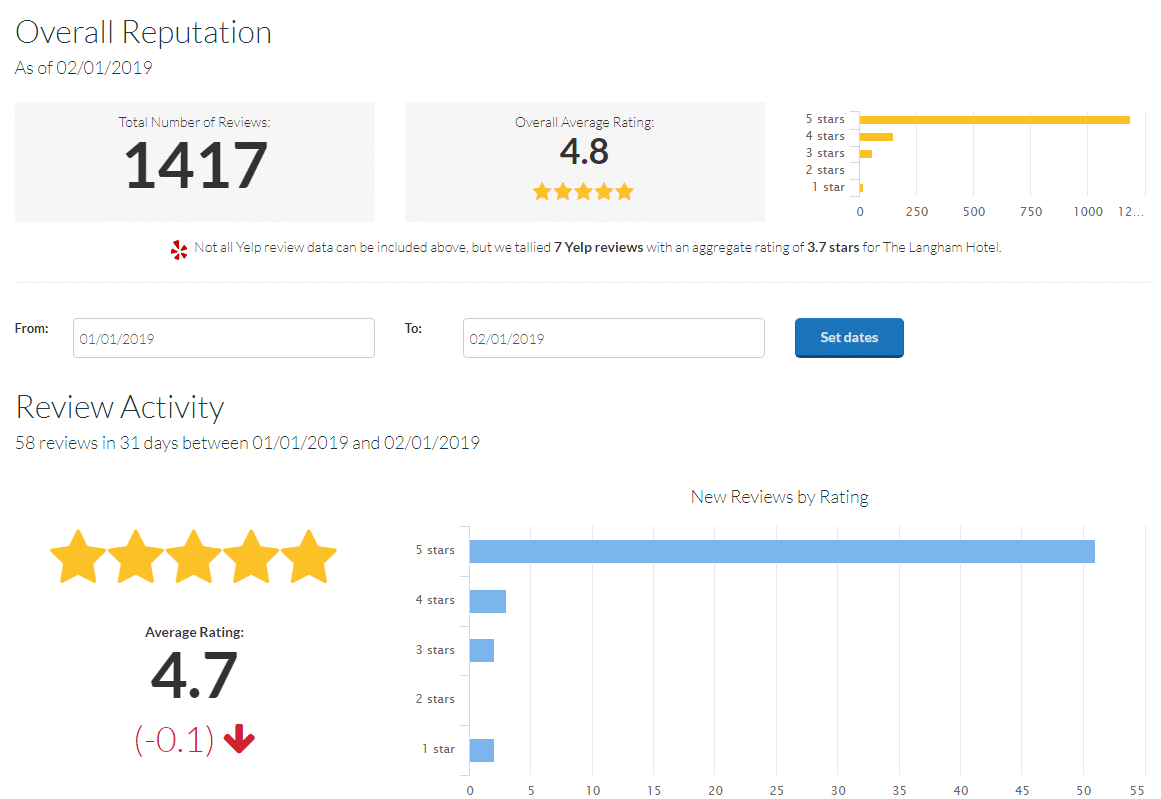
The downloadable Grade.us review management audit spreadsheet
The review management audit spreadsheet below is free (and has more comprehensive sections for a super deep dive).
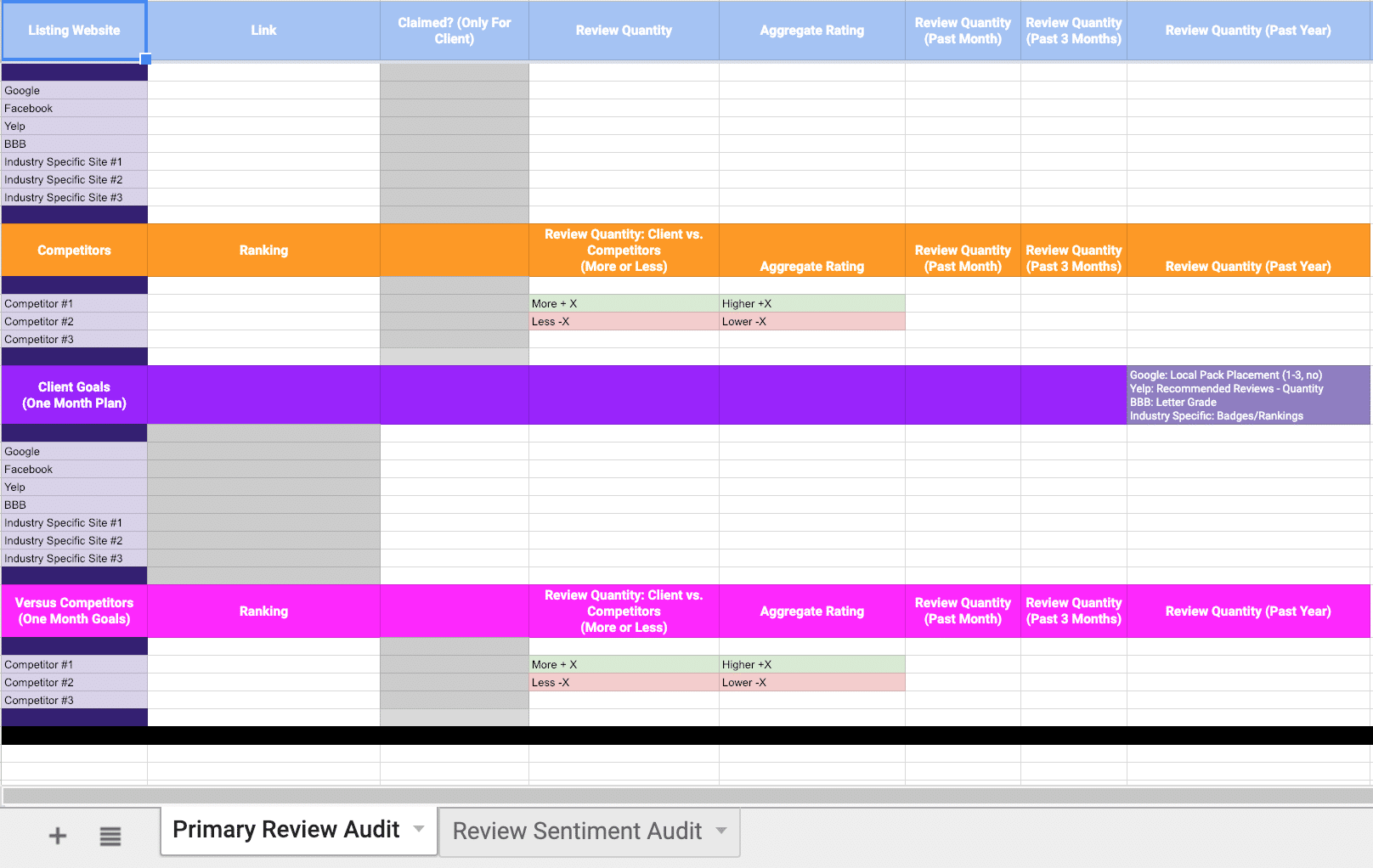
Grade.us provides you with a simple and automated method to extract even more data. With the right approach, you’ll have what you need to conduct a successful audit.
At this point, your audit is ready.
Ready for what?
What sort of conclusions should you be drawing from this audit?
Using this review management audit to inform your strategy
How?
By asking and answering questions!
The data gleaned in your audit gives you clarity, direction and focus. With this audit you’re able to do a light, moderate or deep dive, comparing your business with your competitors.
Review management audit insights: Light dive
These questions show you which platforms are (a.) more likely to perform well. (b.) a viable way to counteract your competitor’s review portfolio and (c.) the platforms that provide you with the opening you need to perform.
- Which competitor has the most reviews, per platform, overall?
- Which review platforms are visible in local search results?
- Which review platforms are your competitor’s strongest?
- Which review platforms are your weakest?
Review management audit insights: Moderate dive
These questions give you a significant amount of intel. Moderate questions like these show you how to score quick wins and the conversion boosting effects that go with it.
- Which review platform do your best/worst customers prefer?
- Which review platforms do customers respond to fastest? Slowest?
- Which review platforms receive the least reviews (post request)?
- Which mainstream sites do customers prefer first? Second? Third?
- What are your customer’s biggest objections?
Review management audit insights: Deep dive
These questions are best answered with additional tools. Event tracking, custom reports and goal setting in Google analytics are all straightforward ways to find the answers to these questions.
- Which review platform sends the most traffic, leads, sales, and revenue to your business?
- Which review platform has the highest conversion rate?
- Which review platform can produce a significant amount of traffic, leads, and sales with a bit of nurturing?
- Which review platform produces customers with the highest lifetime value? Upsell, cross-sell or down sell?
- What are your customer’s biggest complaints? (sentiment analysis)
Why bother asking these questions?
Here’s why.
These questions inform your review strategy. They give you direction and they enable you to focus.
Here’s a hypothetical scenario.
You’ve asked these questions and you’ve received answers.
The results are surprising.
Your Google analytics data shows Facebook recommendations lead to sales more often than niche sites, followed by Google reviews. If you’re looking to generate leads quickly, you know where you need to focus your time and attention.
Now what?
These customers come to you with a specific set of objections about your practice and your competitors. Prospects are nervous about your price and worried about your competitor’s service.
So you change your message.
How?
You provide customers with an irresistible introductory offer. You follow up with Facebook users. You use a retargeting campaign to promote five-star reviews, gushing about your incredible customer service.
Did you see it?
The way your audit informed your strategy? It all starts with questions and answers. Ask the right questions and you’ll have the tools and resources you need to outperform your competitors.
What about agencies?
This is another service you can use to provide significant value to your clients. You can do the initial research and verification legwork your clients need in their audits.
Next, you can provide them with a detailed plan, providing them with actionable strategies and tactics clients can use to produce results. You’ll be able to offer review generation, review monitoring, and review marketing to build your client’s business. These audits, when combined with analysis, reporting and marketing, will verify that your review management campaigns are indeed producing leads, sales and revenue.
This is why a review management audit is so powerful.
Review management audits are the simplest way to boost your conversion rate
A review management audit gives you actionable data and a clear set of guidelines. Data you can use to boost the number of leads, sales and customers you attract for clients (or yourself).
Review management audits provide clarity.
But only if you’re able to ask the right questions. Are review audits necessary?
Absolutely.
Take the time to produce an audit and you’ll have the competitive intelligence you need to make consistently profitable changes in your review management portfolio.

